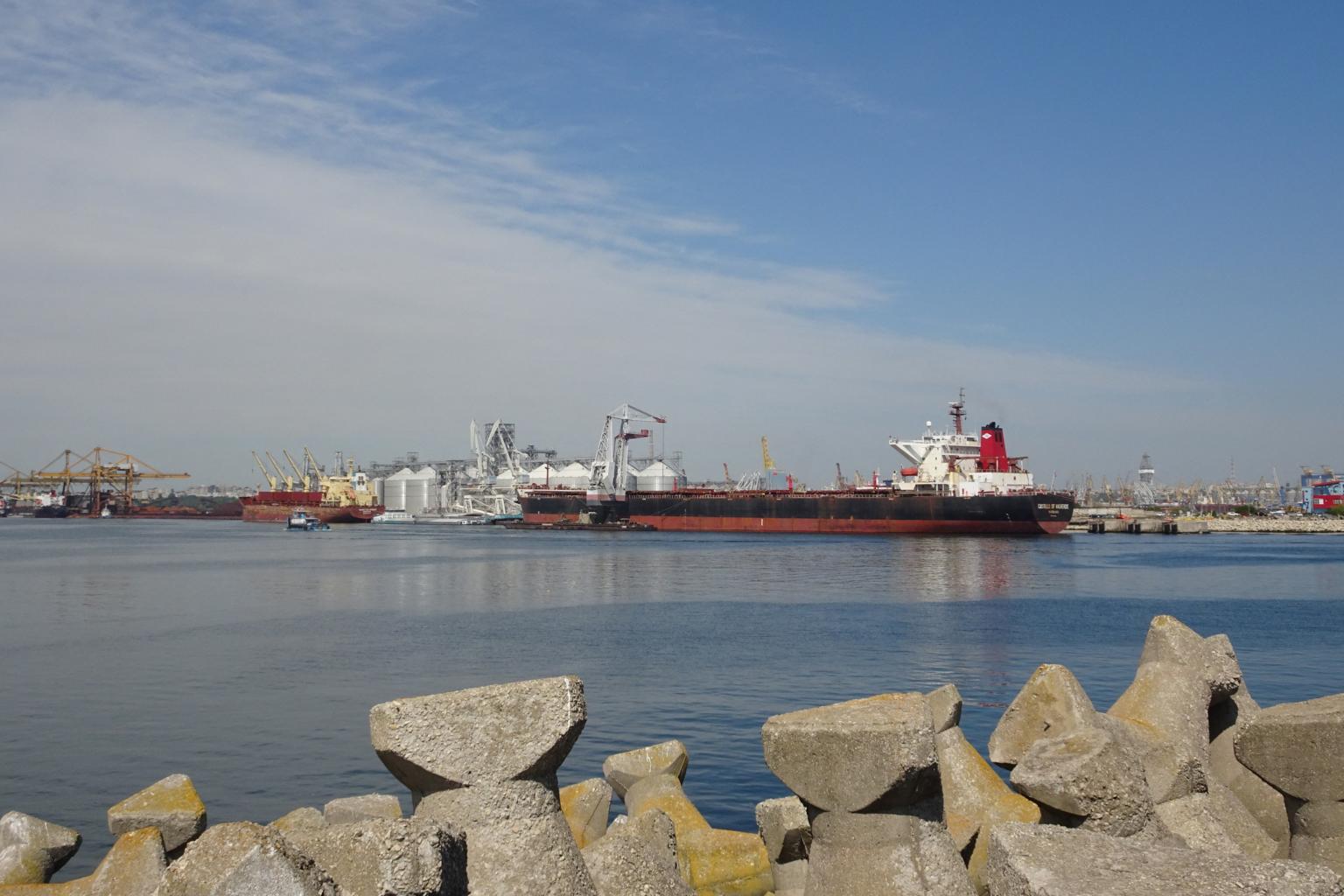The sea mines floating between Ukraine's grain stocks and the world
Sign up now: Get ST's newsletters delivered to your inbox

A cereal terminal with grain silo in the Black Sea port of Constanta in Romania, pictured on May 11, 2022.
PHOTO: REUTERS
LONDON (REUTERS) - As the United Nations tries to broker a path for grain from Ukraine and temper worries about a global food crisis, hundreds of mines laid along the Black Sea present a practical nightmare that will take months to resolve even after any agreement.
The Black Sea is crucial for shipment of grain, oil and oil products.
Its waters are shared by Bulgaria, Romania, Georgia and Turkey, as well as Ukraine and Russia.
Ukrainian government officials estimate 20 million tonnes of grain are unable to travel from what was the world's fourth largest exporter prior to the Russian invasion on February 24.
Kyiv and Western leaders accuse Moscow of weaponising food supplies by blockading Ukrainian ports.
Russia has said it wants Western sanctions lifted as part of any deal to allow exports to flow.
But even if any agreement was reached and Ukraine's ports were able to re-open, the danger from sea mines planted by Ukraine and Russia will hold up shipments potentially for months ahead, according to maritime officials.
"Sea mines have been laid in port approaches and some port exits are blocked by sunken barges and cranes," said a spokesperson with UN shipping agency the International Maritime Organisation, one of several bodies working on establishing sea passage for grain supplies.
"Completely removing sea mines in the port areas would take several months."
Global grain production is forecast to fall short of demand in the 2022/23 season, the International Grains Council says.
The loss of Ukraine shipments will further tighten available supplies and is likely to drive up prices for food staples such as bread, pasta and noodles and add to food inflation, with global hunger already at unprecedented levels.
It is unclear what types of mines have been laid at this stage, Western maritime officials say.
A Ukrainian foreign ministry official told Reuters in March that some 372 sea mines laid by Russia were of the "R-421-75" type, which were neither registered with or used by Ukraine's navy currently and were captured by the Russian military during Moscow's annexation of Crimea in 2014.
Russia's defence ministry said in a statement in March that Ukraine had mined the approaches to the ports of Odesa, Ochakov, Chornomorsk and Yuzhny with 400 obsolete anchor mines.
Russia's FSB intelligence agency also said in March mines had drifted into the Black Sea after breaking off from cables near Ukrainian ports, adding the mines were set by Ukrainian forces.
Ukraine said at the time the FSB warning was wrong and it had no information about any mines drifting out to sea.
On Friday (June 10), the Ukrainian foreign ministry official said Ukraine had placed some mines.
"We have installed naval mines in the exercise of our right to self-defence as stipulated under the Article 51 of the UN Charter."
Russian officials in Moscow and at the embassy in London did not immediately respond to requests for comment on Friday.
Russia's defence ministry said on May 26 Mariupol harbour had been cleared of mines and urged foreign governments to "exert effective influence on the owners of the vessels in Mariupol port to remove them to their permanent mooring place".
Some 84 foreign ships are still stuck in Ukrainian ports - many of which have grain cargoes onboard. Beaches in Odesa are closed with signs warning of mines.
Some of the munitions have drifted as far as Turkey and Romania.
"It's not safe for ships to get in or get out at the moment. Until the mines are swept, that situation is not going to change," said Mr Guy Platten, secretary general of the International Chamber of Shipping, which is also working on opening up maritime channels.
Two seafarers have already died and seven merchant vessels been hit by projectiles - with two sunk - around Ukraine's coast while London's insurance market has placed the entire region on its high risk list meaning soaring costs for shipments.
"Underwriters for their part would need some kind of assurance that it's been done to a given degree by competent minesweepers," said Mr Neil Roberts, head of marine and aviation with the LMA, which represents the interests of all underwriting businesses in the Lloyd's of London insurance market.
Any mine clearing effort would be the biggest attempted since the Iran-Iraq war of the 1980s.
Intelligence on the types of mines laid and where they are located would be required at the outset, said Mr Gerry Northwood, a former captain who commanded warships with Britain's Royal Navy. "Mine hunters would also need to be equipped with remotely operated submersibles to locate and destroy the mines," said Mr Northwood, a consultant with maritime security company MAST.


